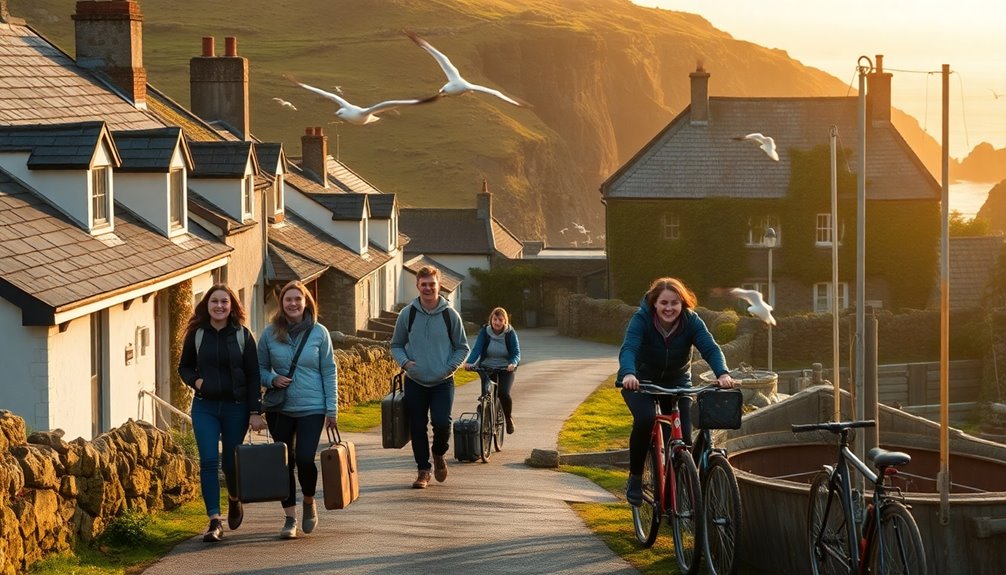
You’ll find Ireland’s rise as an English-stay magnet grew from centuries of schooling, village hospitality and informal conversation circles that turned classrooms, pubs and homestays into living language labs. You’ll see how Dublin’s culture, Cork’s food and Galway’s festivals shaped practical learning, while host families and shared flats made immersion affordable and social. Practical systems—transport, visas, healthcare and banking—were woven into student life, and if you stick with this guide you’ll uncover the surprising archival threads behind it all.
Highlights
- Ireland’s language-stay tradition began with countryside homestays blending English practice and cultural immersion for authentic daily learning.
- Early programs grew from grassroots conversation clubs and community partnerships that prioritized practical speaking over formal classroom work.
- Historic routes and local hospitality shaped student placements in Dublin, Cork, and Galway, linking travel, culture, and learning.
- Festival culture and literary tours turned public events into dynamic, performance-based English practice opportunities.
- Institutional support evolved alongside visa, banking, and healthcare systems to formalize stays while preserving informal social networks.
Why Ireland Became a Hub for English-Learning Stays
Because Ireland offered a distinctive mix of accessible English, welcoming host communities, and an established education sector, it quickly emerged as a go-to destination for language stays. You’ll trace archival records showing early programs framed around cultural immersion, countryside homestays, and informal conversation clubs that let you practice freely. Interpreting those sources, you’ll see how historical significance—colonial legacies, literary renown, and migration patterns—shaped curricula and community partnerships. You’ll appreciate how freedom-seeking learners found flexible, experiential learning instead of rigid classrooms. These contextual readings reveal intentional design: programs built to liberate language use, honor local life, and sustain meaningful exchange.
Cities Where Students Thrive: Dublin, Cork, Galway and Beyond
Three Irish cities—Dublin, Cork, and Galway—emerge repeatedly in archival guides and program records as the places where students not only learn English but also plug into local social life. You trace Dublin culture through preserved itineraries, seeing how museums, pubs, and literary tours became classrooms beyond grammar. Cork cuisine appears in menus and municipal reports, signaling tastes that invite conversation practice. Galway festivals show up as seasonal nodes where language and performance intersect. Across documents, student communities recur as networks enabling autonomy, exchange, and mobility. These records interpret urban rhythms as freedoms that shaped your learning trajectories.
Housing, Transport and Daily Costs for International Students
Those city-centered itineraries and student networks didn’t just shape where you slept, how you moved, and what everyday expenses counted in your budget. You trace archival listings and local ads to map accommodation options — host families, shared flats, student residences — each promising different routines and freedoms. Historic transport routes and fare tables show how bus, tram, and rail shaped your daily radius. You perform a cost comparison: rent, groceries, fares, occasional nights out, weighing autonomy against predictability. Interpreting receipts and timetables, you learn that practical choices carried cultural meaning, steering how freely you lived and studied.
Study-Life Balance: Work Rights, Social Life and Student Support
When you sift through employment notices, student handbooks and welfare reports, a pattern emerges: formal work rights, shifting visa rules and local labor markets together framed how much time students could devote to classes, paid work and leisure. You read archival notes that show administrators balancing institutional reputation with student well being, and you trace how grassroots social networks bolstered cultural integration. You’d find testimonies about late shifts, study groups and welfare clinics that reveal everyday negotiations for autonomy. In that record freedom wasn’t just legal entitlement but practical support—peer advice, flexible timetables and community ties that made choice real.
Practical Tips for Navigating Visa, Healthcare and Banking

Because the rules on visas, healthcare and banking were constantly being rewritten in response to policy shifts and local practice, you’ll get the clearest picture by treating official documents and lived accounts together: compare immigration circulars and university memos with student letters and clinic logs to see how access actually worked, note which provisions were routinely enforced or ignored, and keep track of timelines so you know whether a reported workaround was exceptional or commonplace. You should archive receipts and correspondence during a visa application, map clinics and entitlements for healthcare access, open a basic local account fast, and document any refusals to protect your freedom.
Some Questions Answered
Can I Bring a Pet to Ireland During My Stay?
Yes — you can bring a pet to Ireland, but you’ll need to follow pet travel regulations: microchip, up-to-date rabies vaccination, and an EU pet passport or third-country health certificate. You’ll find pet friendly accommodations in many towns, though availability varies, so plan and book early. Think of this as preserving both your freedom and your pet’s wellbeing; archival records and veterinary checks protect public health while letting you roam together.
Are There Gluten-Free/Halal Food Options in Student Cafeterias?
Yes — you’ll usually find gluten free options and halal meals in student cafeterias, and by coincidence those choices often grew from small student campaigns archived in campus records. You’ll want to check menus and allergy notices, and many places label dishes or offer separate stations. Bring your preferences when you enroll, ask dining staff, and keep a list of trusted eateries nearby. You’ll enjoy the freedom to eat safely and ethically.
How Safe Are Homestays for Solo Female Students?
Homestay safety for solo female students is generally high when you choose vetted hosts, check references, and trust your instincts. You’ll find records, reviews, and archived communications useful for evaluating risk and fitting the freedom you want. Interpretive guidance—ask about house rules, female-only options, emergency contacts, and local transport—lets you preserve independence while staying secure. Keep copies of important info and maintain regular check-ins with your program.
Can I Transfer Credits to My Home University?
Like a bridge you can walk, yes — you can often arrange a credit transfer to your home university if courses match and approvals are granted. You’ll document syllabi, grades and learning outcomes, then submit them for evaluation; archival records and faculty interpretation matter. Policies differ, so check articulation agreements, residency rules and deadlines. You’ll want written pre-approval where possible to preserve freedom in planning your study path and credit recognition.
Are There Student Discounts for Travel to the UK?
Yes — you can find student discounts for travel to the UK. You’ll discover student deals with railcards, youth coach fares, and budget airlines; use travel tips like booking early, carrying an NUS/ISIC card, and checking student bundles. Contextual records show evolving offers; interpretive notes urge flexibility and independence. Archival searches of provider sites and forums will reveal patterns, letting you choose freedom-minded routes and economical, experience-rich trips across the UK.
Summing Everything Up
You’ve traced how Ireland’s classrooms, cobbled streets and warm hosts shaped global English learning—so what image stays with you: a rain-slicked lane echoing with new voices? You’ll carry practical maps of visas, healthcare and banking, plus clear expectations about costs, housing and work rights. Let those archival threads—city histories, student stories and policy shifts—guide your choice, interpreting past patterns to pick the stay that’ll shape your future fluency.
